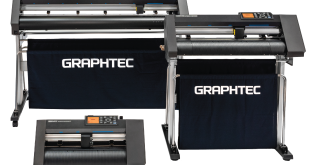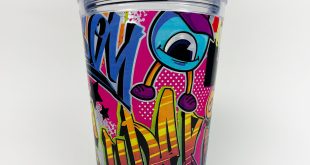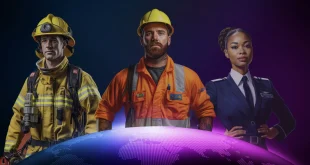 Those of you that visited Printwear & Promotion LIVE! back in February may have stumbled across first time exhibitor Vapor Apparel – a company dedicated to producing the ultimate in sublimation-friendly garments and accessories. P&P editor Melanie Attlesey spoke with owner and founder Chris Bernat to find out more about this exciting industry and his plans for the UK market.
Those of you that visited Printwear & Promotion LIVE! back in February may have stumbled across first time exhibitor Vapor Apparel – a company dedicated to producing the ultimate in sublimation-friendly garments and accessories. P&P editor Melanie Attlesey spoke with owner and founder Chris Bernat to find out more about this exciting industry and his plans for the UK market.
Vapor Apparel hails from Charleston in South Carolina. It was founded 13 years ago by Chris Bernat and his business partner Jackson Burnett. Chris has a solid background in sublimation after working for Sawgrass for many years, while Jackson’s background is in yarn having previously worked for Unifi, a company specialising in poly yarn and fibre.
Chris playfully says: “We took the ink nerd and the fibre nerd and said we were going to make garments that were myopically focused on sublimation.” Adding: “The best thing that can happen to you in your career is to find a problem that you can solve. I feel blessed that when I worked at Sawgrass I was exposed to the problem of people bringing me Nike or Under Armor shirts and they were melting on the press or they were flashing. Jackson and I realised we could solve these problems.”
And this is exactly what Vapor Apparel has done – it has solved sublimators’ problems by creating a range that is entirely sublimation friendly. Its range extends to over 100 garments and accessories perfectly suited to sublimation printing. And now the company intends to gain a foothold in the UK market.
The UK market
Earlier this year Vapor Apparel set up a warehouse operation in Holland to better serve the European market and to help replenish European distributors’ stock more easily and quickly. Chris explains: “We haven’t yet finalised our distribution set up for the UK, but what we have finalised is our commitment to UK printers.” Vapor Apparel’s full product line has been available to the UK market since March.
But why should UK sublimators be interested in Vapor Apparel’s products?
For starters, despite all products being made from 100% polyester they have a soft cotton-like feel. Chris explains: “We have a shirt called the Basic T, however it is far from basic. It’s got a lot of technology built into it, for example it’s got heat-set yarn and fabric so it doesn’t shrink on the press. The goal of the Basic T was to get rid of sublimators’ biggest problems. Sublimators have what I call cotton envy. The Basic T is specifically engineered to look and feel like cotton.”
He adds: “We had one lady come up to our stand at the show and accuse me of lying because she could not believe our Basic T contained no cotton. It’s a good problem to have.”
 According to Chris there are a lot of garment manufacturers out there manufacturing 100% polyester shirts and claim that they are ready for sublimation. “Being made from 100% polyester does not make a garment automatically ready for sublimation. We do things with our yarn and our fabric to make our garments sublimation ready. One of our mill partners in South America has recently invested $500,000 in improving their ventilation system as any third party material can be extremely dangerous in sublimation. When you heat press a shirt you are opening the molecules and if there is dust on that shirt or any loose fibres this can cause issues with the print,” adds Chris.
According to Chris there are a lot of garment manufacturers out there manufacturing 100% polyester shirts and claim that they are ready for sublimation. “Being made from 100% polyester does not make a garment automatically ready for sublimation. We do things with our yarn and our fabric to make our garments sublimation ready. One of our mill partners in South America has recently invested $500,000 in improving their ventilation system as any third party material can be extremely dangerous in sublimation. When you heat press a shirt you are opening the molecules and if there is dust on that shirt or any loose fibres this can cause issues with the print,” adds Chris.
Another point that sets Vapor Apparel apart from the rest of the market is its colour gamut. Chris explains: “I’ve given up counting how many people have told me that you can only sublimate on white, this is an inherently incorrect statement. More than 75% of what we sell to sublimators is not white. We have been running up against this fallacy that you can only print on white for 10 years. The only colours that you are unable to sublimate are dark colours.”
Chris and his team put a lot of effort into determining which colours join their range. “Take for example our light blue Basic T. When we decided to pick that colour we had our mill send us 11 different light blues, then we analysed these samples with a spectrophotometer to determine which one had the highest level of print accuracy. This takes a lot of time, but we’ve seen the benefits as volume of sales are up,” he explains.
Product innovation
As well as varying types and styles of T shirts, Vapor Apparel also supplies a myriad of accessories, including dog bandanas, scarves and socks. Socks, Chris says, has become a huge part of the sublimation market in the US.
This trend originated from basketball teams wanting socks to match their shoes. “We are seeing sublimators setting up on site at games and printing socks on demand for fans,” says Chris. Just a quick search of #customsocks on Instagram demonstrates the popularity of this product.
After introducing socks into Vapor Apparel’s range three years ago, a hunting sock is the latest addition, as Chris explains: “If you are going up a mountain you don’t want a regular athletic sock, you want something with a little warmth to it. We have created a sock that is cotton and wool on the inside and polyester on the outside. Even with the sock category you have to innovate.”
It is this desire to innovate that led to the introduction of the Solar Performance line – a range of clothing with in-built UPX50+ sun protection. Chris says these garments are growing in popularity in the sports market, as well as the gift/ souvenir market in holiday resorts.
And the innovation doesn’t stop there. Chris says that Vapor Apparel is currently working on a new fabric that repels water. Code named Water Stop, this fabric utilises the same technology used in the military to prevent soldiers from getting wet in the jungle, but is being tweaked to make it sublimation friendly. “The point is that we always have something going on in product development,” says Chris.
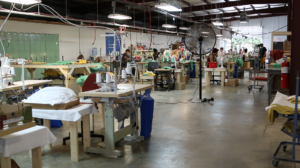 Vapor Apparel’s products are priced at the upper end of the market, but Chris reasons this by saying they have considered every problem a sublimator could possibly encounter and solved it. “We don’t want people experiencing shrinkage or colours that don’t work or not having access to the correct time or temperature recommendations. We find that sublimators are willing to pay more for a shirt that will ultimately contribute to a lower error rate in their print shop. I tell people we make Land Rovers and BMWs, but they are competitively and fairly priced for what they are. We have been referred to as the customisable version of Adidas and Nike,” says Chris.
Vapor Apparel’s products are priced at the upper end of the market, but Chris reasons this by saying they have considered every problem a sublimator could possibly encounter and solved it. “We don’t want people experiencing shrinkage or colours that don’t work or not having access to the correct time or temperature recommendations. We find that sublimators are willing to pay more for a shirt that will ultimately contribute to a lower error rate in their print shop. I tell people we make Land Rovers and BMWs, but they are competitively and fairly priced for what they are. We have been referred to as the customisable version of Adidas and Nike,” says Chris.
Vapor Apparel is currently riding on a high in the US and has grown by 25% each year for the last five years. In addition to this it was recently named as the seventh fastest growing company in South Carolina. It is this success that the company is hoping to emulate in the UK.
“We like to say we perform well on the press and on the field,” says Chris. And let’s hope that remains true as Vapor Apparel begins its venture into the UK market.
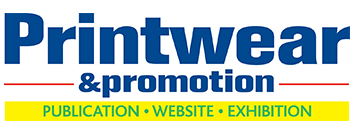 Printwear & Promotion The Total Promotional Package
Printwear & Promotion The Total Promotional Package
